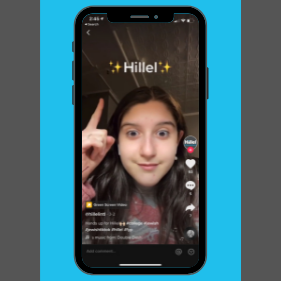The Inclusive World of Jewish TikTok

Jewish content has found its newest home on the short-form video sharing app TikTok.
The app—which currently boasts over 689 million active monthly users— has captured a certain zeitgeist of the emergent 2020s era. TikTok is an open space for users to do trending dances (“Clap For Em”) and comedic bits (“People Can Do Hard Things”); but it is also a place for advocacy and education. Gone are the days of follower-following-based newsfeeds; TikTok’s “For You Page” (FYP) is catered to each individual user’s interests. That is, on this app, anyone can find anyone.
“Jewish TikTok” has introduced Jews who never would have otherwise known one another and bonded them for a common goal: Jewish advocacy and education.
In March 2021, Hillel International launched the inaugural TikTok Ambassadorship. This is a paid semester-long opportunity for college students to elevate their voices within the Jewish TikTok community by creating original content for the Hillel account. This semester’s ambassadors are Lily Cohen at Northwestern University, Jill Friedland at Muhlenberg College, Josh Kerzhner at the University of Rochester, Libby Walker, a recent graduate of the University of Buffalo, Talia Scharf at American University, and Allison Zweig at the University of Connecticut.
“It’s been really fun,” said Zweig about her time as an ambassador. “I really love the creativity of [making TikToks]. We try to cover different aspects of Judaism; so, if I make one that is more religious, then the next one will be more cultural.”
In Zweig’s most recent video on Hillel International’s TikTok account, she asks viewers to “tell me you’re Jewish without actually telling me you’re Jewish.” This is a spin on the popular “Tell Me You’re ____ Without Telling me You’re ___” trend, in which users can reply—or “stitch”— the video with their response. Zweig shared her own answer in the video, displaying pictures of herself with friends from BBYO, friends from sleepaway camp, and friends from UConn Hillel. This video is quintessential TikTok—casual, authentic, and based in community.
Where TikTok excels as a tool for engagement between members of the Jewish community, it outdoes itself as an outlet for Jews who are excited to share their traditions and culture with non-Jews.
“On the first night of Hanukkah, I made a video about the chanukiah that my family uses and how it was smuggled out of Germany by my great grandparents,” said Friedland of a video posted to her personal TikTok account. “There were so many comments of people that had never even met a Jewish person before. They were saying how wonderful it was to see this kind of artifact. That interaction, having people see that part of my life, was really impactful.”
Because TikTok’s FYP is algorithm-based, there is a constant opportunity to learn and discover. With that, however, comes inevitable disagreements and even “troll” accounts, that often leave antisemitic comments.
“The culture of antisemitism is so pervasive across the platform. Even though there’s not a lot that’s directed towards me in my own videos, I still see it everywhere,” said Friedland.
“You have to go into it with a mindset that people are inherently just asking questions and that by understanding their lived experiences, you’ll be able to build bridges on topics that might be divisive,” said Michael Kagan, Senior Associate of Global Student Leadership at Hillel. “If you want to respond to user5477… understand that that person is probably just a troll. But if it’s a name you recognize and they’re asking genuine questions, then, sure, engage. I will typically engage with them, ultimately, and have a great conversation. Even if we disagree, I try to set that example for the students that I work with, that you need to be able to step outside your comfort zone even when it’s someone that might inherently disagree with your worldview.”
In representing the community to non-Jewish TikTok users, Jewish TikTok users have bonded over a defense of and love for Judaism and Jewish culture.
“I think this is the first time people are having the ability to talk to people who are different from them. Orthodox Judaism and Reform Judaism might be very separate at times, but TikTok gave people the opportunity to interact with people they might have not been friends with in the real world— not because they didn’t want to but because they wouldn’t have had the opportunity,” said Adam Bershad, Director of Jewish Student Life at Central Florida Hillel.
The Jewish communities on other social media platforms remain niche; if a user follows a Reform Jewish Instagram account, they will only see Reform Jewish content; if a user joins a Conservative Jewish Facebook group, they will only see Conservative Jewish content. TikTok’s FYP strategy bridges the gap between Jewish communities in an unprecedented way online.
“We are creating the inclusive Jewish community that we want, so that if someone who isn’t Jewish stumbles upon our feed, what they see is an open and welcoming and vibrant community. To me, that has been the success of TikTok,” said Kagan. “It’s the authenticity; it’s the inclusivity; and it’s the understanding that we need to come together to showcase the beauty of our community so that when others outside of it engage with us, they see how vibrant we truly are.”